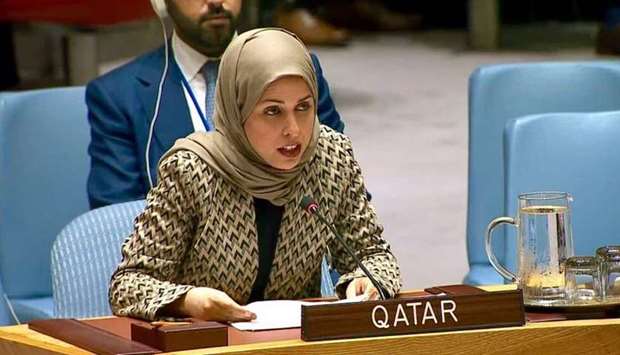Qatar has reiterated its commitment to mediation to settle conflicts and disputes by peaceful means.
Qatar's Permanent Representative to the United Nations HE Ambassador Sheikha Alya Ahmed bin Said al-Thani said Qatar has committed itself to being a partner of the international community in the face of common challenges.
She was speaking at a debate held by the Security Council on "Maintenance of International Peace and Security: Mediation and the Peaceful Resolution of Conflicts."
Sheikha Alya said despite the unjust siege and illegal unilateral measures imposed since June 5, 2017, Qatar continues its policy consistent with its obligations under the Charter of the United Nations and international law and working to settle disputes and conflicts by peaceful means.
She renewed Qatar's appreciation for the mediation led by Kuwaiti Emir Sheikh Sabah al-Ahmad al-Jaber al-Sabah to resolve the Gulf crisis and contribute to enhancing the security and stability of the region and international peace and security.
Sheikha Alya said mediation has always been an essential part of diplomacy, conflict resolution, negotiation, arbitration and reconciliation as the first choice in dealing with disputes.
She noted that mediation is not a substitute for other tools to prevent conflicts, but is rather integrated with such tools within the framework of a comprehensive strategy for the prevention, resolution and management of conflicts.
The ambassador stressed the importance of addressing the root causes of conflicts while recognising the link between peace, security, development and human rights.
In recent years, the international community has become increasingly aware of these realities and of the importance of giving priority to preventive diplomacy and the peaceful settlement of disputes, including through mediation, Sheikha Alya said, noting that the UN General Assembly adopts every two years a resolution on mediation submitted by Turkey and Finland and supported by a large number of states, including Qatar.
She referred to a report of the Panel on United Nations Peace Operations which stressed peace processes must focus on the need to achieve political solutions.
Sheikha Alya expressed satisfaction at the evolution of mediation arrangements and tools at various levels, stressing that it was necessary to keep pace with the changes in the nature of conflicts and threats to peace and security.
The ambassador stressed the important role of the civil society and the private sector, noting that the success of mediation strategies in many cases depended on the identification and involvement of appropriate stakeholders.
She also noted the importance of involving both women and young people in peacemaking and mediation to ensure effectiveness and sustainability of those efforts.
Sheikha Alya reviewed Qatar's experience in mediation, especially in the Arab and Islamic region, which resulted in many successes in the resolution and settlement of disputes or avoiding further escalation.
These efforts have been recognised and supported by the UN Security Council, she added.
She said the primary responsibility for settling disputes lay with the parties to the conflict, stressing the importance of their participation and their full commitment to settlement, and the realisation of the common interest of achieving reconciliation.
She was speaking at a debate held by the Security Council on "Maintenance of International Peace and Security: Mediation and the Peaceful Resolution of Conflicts."
Sheikha Alya said despite the unjust siege and illegal unilateral measures imposed since June 5, 2017, Qatar continues its policy consistent with its obligations under the Charter of the United Nations and international law and working to settle disputes and conflicts by peaceful means.
She renewed Qatar's appreciation for the mediation led by Kuwaiti Emir Sheikh Sabah al-Ahmad al-Jaber al-Sabah to resolve the Gulf crisis and contribute to enhancing the security and stability of the region and international peace and security.
Sheikha Alya said mediation has always been an essential part of diplomacy, conflict resolution, negotiation, arbitration and reconciliation as the first choice in dealing with disputes.
She noted that mediation is not a substitute for other tools to prevent conflicts, but is rather integrated with such tools within the framework of a comprehensive strategy for the prevention, resolution and management of conflicts.
The ambassador stressed the importance of addressing the root causes of conflicts while recognising the link between peace, security, development and human rights.
In recent years, the international community has become increasingly aware of these realities and of the importance of giving priority to preventive diplomacy and the peaceful settlement of disputes, including through mediation, Sheikha Alya said, noting that the UN General Assembly adopts every two years a resolution on mediation submitted by Turkey and Finland and supported by a large number of states, including Qatar.
She referred to a report of the Panel on United Nations Peace Operations which stressed peace processes must focus on the need to achieve political solutions.
Sheikha Alya expressed satisfaction at the evolution of mediation arrangements and tools at various levels, stressing that it was necessary to keep pace with the changes in the nature of conflicts and threats to peace and security.
The ambassador stressed the important role of the civil society and the private sector, noting that the success of mediation strategies in many cases depended on the identification and involvement of appropriate stakeholders.
She also noted the importance of involving both women and young people in peacemaking and mediation to ensure effectiveness and sustainability of those efforts.
Sheikha Alya reviewed Qatar's experience in mediation, especially in the Arab and Islamic region, which resulted in many successes in the resolution and settlement of disputes or avoiding further escalation.
These efforts have been recognised and supported by the UN Security Council, she added.
She said the primary responsibility for settling disputes lay with the parties to the conflict, stressing the importance of their participation and their full commitment to settlement, and the realisation of the common interest of achieving reconciliation.

